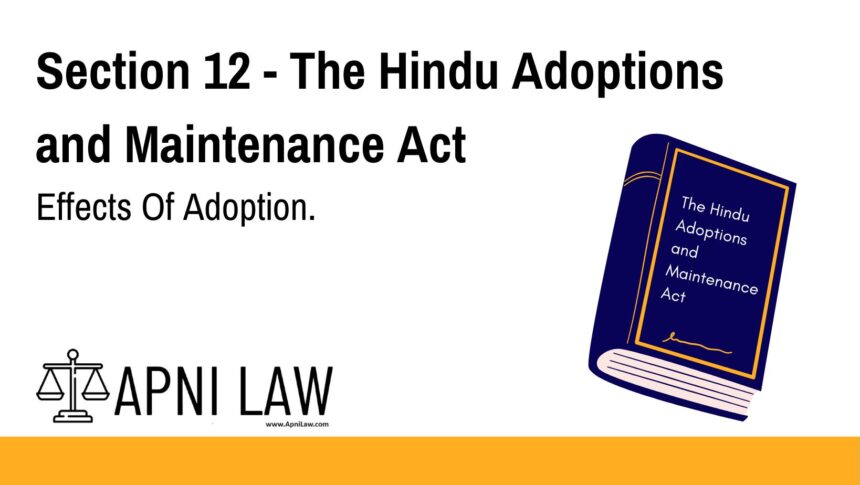Code: Section 12 – Effects of Adoption
An adopted child is considered to be the child of the adoptive parents for all purposes from the date of adoption. This change severs the child’s connections with their birth family and replaces them with ties to the adoptive family. However, there are certain exceptions:
- Marriage Restrictions: The adopted child cannot marry a person whom they could not have married had they remained in the birth family.
- Property Rights: Any property that the adopted child owned before adoption will continue to be theirs, subject to any obligations associated with that property, including the duty to maintain relatives in the birth family.
- No Impact on Pre-Adoption Estates: The adopted child will not divest anyone of any estate they owned before adoption.
Explanation of Section 12 – Effects of Adoption
Section 12 outlines the legal effects of adoption under The Hindu Adoptions and Maintenance Act. Adoption has significant legal consequences, primarily severing the child’s connection with their birth family and establishing a new legal relationship with the adoptive family.
- Child as Part of Adoptive Family:
Once a child is adopted, they are considered the legal child of their adoptive parents. This is true for all legal purposes, such as inheritance, maintenance, and family rights, from the date of adoption. - Severance from Birth Family:
The legal ties with the child’s birth family are considered severed upon adoption. All rights and responsibilities in the birth family are replaced with those of the adoptive family. - Marriage Limitations:
While the adopted child becomes part of the adoptive family, they still cannot marry someone they would not have been allowed to marry if they had remained in the birth family. This rule ensures the child’s rights to maintain ties and traditions with their birth family. - Property Retention:
The adopted child retains property that was theirs before adoption. However, the child is still responsible for any obligations associated with that property, such as the duty to maintain relatives in the birth family. - No Loss of Previous Inherited Estates:
The adoption does not remove the adopted child’s entitlement to any property or estate they inherited prior to the adoption. This ensures that the child’s previous inheritance rights are not disturbed.
Illustration
Here are some examples to clarify Section 12:
- Example 1: A girl adopted by a new family will inherit property from her adoptive parents. However, she cannot marry someone whom she could not have married in her birth family (e.g., a close relative).
- Example 2: A boy who owns a house before being adopted will retain ownership of that house. He will also still have the responsibility to support his biological parents if they are in need.
Common Questions and Answers
1. Can an adopted child marry someone from their birth family?
No, the adopted child cannot marry a person whom they could not have married if they remained in their birth family.
2. What happens to the adopted child’s property after adoption?
The adopted child retains any property they owned before adoption. The child is also responsible for any obligations related to that property.
3. Does adoption change inheritance rights from the birth family?
No, adoption does not remove the adopted child’s rights to inherit property or estates from their birth family before adoption.
Conclusion
Section 12 addresses the legal transformation an adopted child undergoes when joining a new family. While it severs the ties with the biological family, it ensures that the child’s property rights and obligations remain intact. It also carefully defines limits on marriage and inheritance, balancing the rights of both the adopted child and their birth family.








